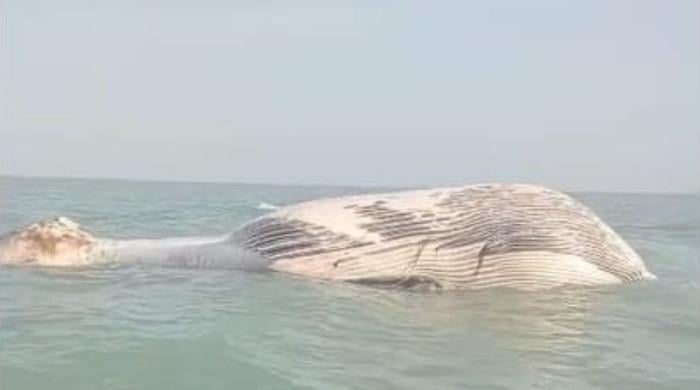Dead Blue Whale Found Near Pakistan-Iran Border
A deceased blue whale, approximately 35 feet in length, was discovered on Monday in the Gwatar Bay area, situated between Pakistan and Iran. The remote location of the find highlights the challenges in monitoring marine life in this region.
Ahmad Baloch, a local fisherman active in the vicinity, initially reported the sighting of the whale carcass floating near Kuntani, Balochistan. His timely report brought the incident to the attention of relevant authorities.
According to a statement released by WWF-Pakistan, it is believed that the whale likely perished several days ago in the open waters shared by Pakistan and Iran. Its remains were then carried towards Gwater Bay by rough seas and strong oceanic currents.
The precise cause of death remains undetermined. However, preliminary assessments suggest the possibility that the animal became ensnared in gillnets commonly employed for fishing activities in the coastal and offshore zones of the area.
The blue whale, known scientifically as Balaenoptera musculus, represents one of three baleen whale species documented in Pakistani waters. Its presence underscores the biodiversity of the region’s marine ecosystem.
Besides the blue whale, the other two baleen whale species identified in Pakistani waters include the Bryde’s whale and the Arabian humpback whale, each contributing to the area’s marine fauna.
Among blue whales, four subspecies exist, including the pygmy blue whale (Balaenoptera musculus brevicauda) and the Indian Ocean blue whale (Balaenoptera musculus indica), both of which inhabit the Northern Indian Ocean.
Given its relatively small size, the deceased blue whale observed at Kuntani could potentially be classified as a pygmy blue whale, although further investigation would be required for definitive confirmation.
Muhammad Moazzam Khan, Technical Advisor at WWF-Pakistan, voiced concerns regarding the blue whale’s mortality, describing it as a somber development for the global conservation community. The incident highlights the need for increased protective measures.
Khan noted that the blue whale’s distribution range encompasses the tropical and subtropical waters of the Indian Ocean, making this region critical habitat for the species. Its presence here emphasizes the importance of conservation efforts in this area.
Khan further emphasised that the blue whale is classified as an endangered species, underscoring the urgent need for comprehensive conservation strategies to safeguard its population and habitat.
Presently, all cetaceans, encompassing both whales and dolphins, receive protection under the wildlife and fisheries legislation enacted by the provinces of Sindh and Balochistan. This legal framework provides a foundation for conservation efforts.
Khan also advocated for the enactment of federal legislation to protect cetaceans, including whales, within Pakistan’s Exclusive Economic Zone, thereby extending legal safeguards to these marine mammals across a broader maritime area.
Numerous records document the presence of blue whales in Pakistani waters. The most recent prior sighting occurred off the coast of Gaddani, Balochistan, on April 8, 2024, demonstrating the species’ continued presence in the region.
Blue whales hold the distinction of being the largest animals ever known to inhabit the Earth. They can attain lengths of up to 33 meters and weigh as much as 190 tonnes, highlighting their immense size and ecological significance.



Comments (0)
No comments yet. Be the first to comment!
Leave a Comment